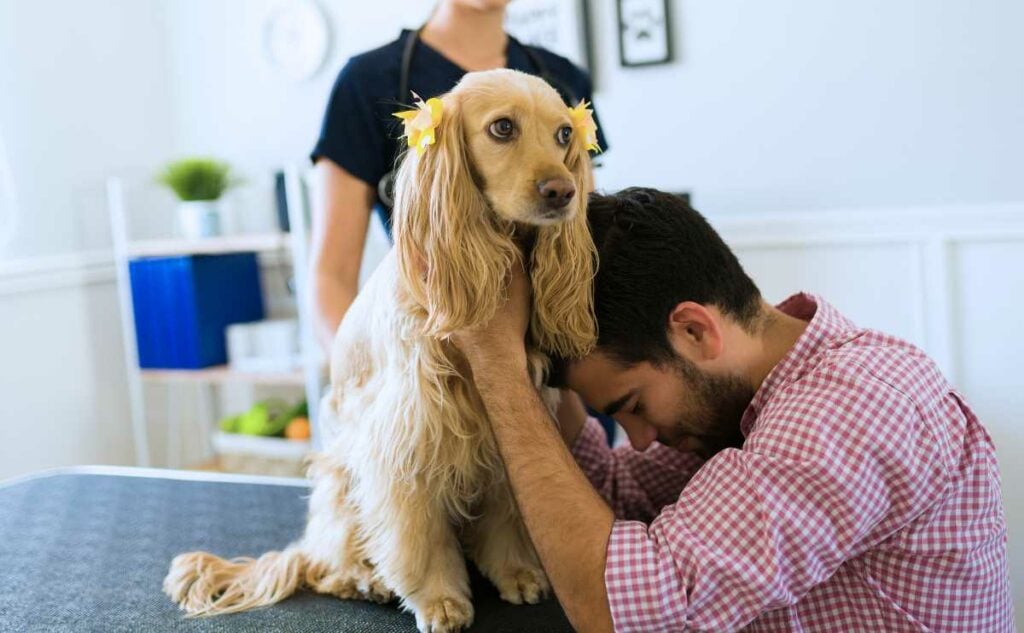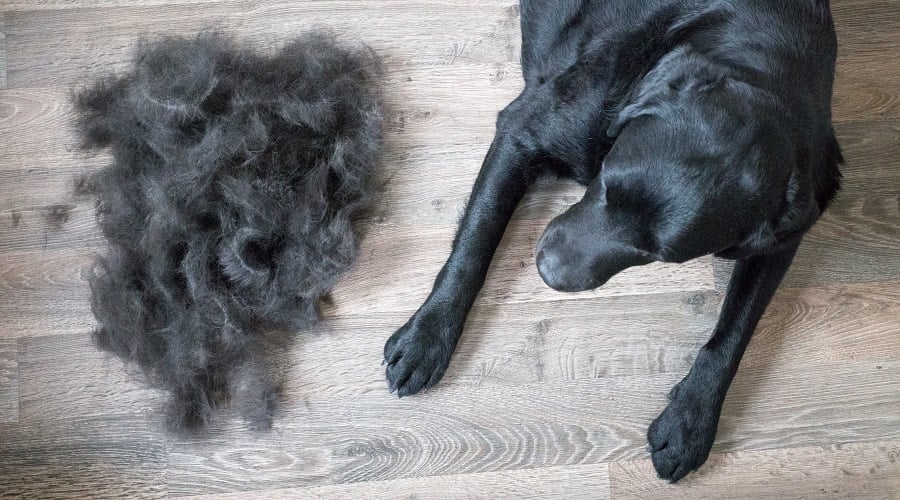Losing A Dog Hurts More Than You Expect—Here’s How to Heal
When you purchase through links on our site, we may earn a commission. Here’s how it works.
The leash still hangs by the door. The bowl is untouched. And the house, once filled with joyful chaos, now echoes with a painful silence. Losing your dog isn’t just losing a pet. It’s losing a rhythm, a ritual, a part of your soul that wagged its tail every time you walked in the room. If your heart feels cracked open right now, you’re not alone.
Table of Contents

Why This Hurts So Much
If you’re struggling with how to deal with the death of a dog, know that your grief is valid and deeply rooted in love and biology.
Science has finally caught up to what our hearts have always known: dogs are family. Research supports the idea that the grief and loss a pet can mirror the emotional toll of losing a human loved one. The limbic system—the part of your brain tied to emotional bonding—doesn’t distinguish species. So when your dog goes, your body responds as if a piece of you has vanished. And in a very real way, it has.
Your dog was part of your daily rhythm. They were the first “hello” in the morning, the shadow that followed you from room to room, the calming presence after a hard day. When that’s gone, it leaves more than a void. It disrupts everything familiar.
Many people feel ashamed of their grief, especially if others minimize it. But mourning a dog is not just valid—it’s deeply human. This loss isn’t “just a pet.” It’s the loss of unconditional love, of comfort, of identity. It’s the loss of a chapter of your life.
Allow yourself to feel it fully. You are not being dramatic. You are being honest—with your heart, your memories, and the place your dog still holds inside you.
Knowing When It’s Time to Say Goodbye
One of the most heart-wrenching decisions you’ll ever face is whether—and when—to put your dog down. There’s no easy answer, but there are signs that can help you make a compassionate choice. Ask yourself:
- Is your dog in chronic pain with no relief?
- Are they no longer eating, playing, or engaging with you?
- Do good days no longer outnumber the bad?

These are painful questions but necessary ones. Talk with your vet. Talk with your family. And most importantly, trust your bond—you know your dog better than anyone.
For more guidance, read When To Put A Dog Down and Dog Euthanasia: What To Expect & How To Prepare.
Before Goodbye: Navigating Anticipatory Grief
Anticipatory grief is part of learning how to deal with the death of your dog before it even happens. That emotional preparation matters.
If your dog was elderly or terminally ill, you may have started grieving before the moment of death. That slow ache—the dread, the hope, the guilt—is called anticipatory grief. It’s love trying to hold on a little longer. If you’re still in that space, let yourself cry now.
Take photos. Record their howl. Sit in the sun together. These quiet moments matter more than words ever will.
Meaningful Keepsakes To Make Before They Go
Creating keepsakes during your dog’s final days can be an act of love and healing. These small, tangible reminders can help anchor your memories once they’re gone—and give you something beautiful to hold onto.
- Memory box – Start gathering their favorite toy, collar, or blanket. Write a note to your future self to include inside.
- Nose print jewelry – Some jewelers can turn your pet’s nose print into a pendant, bracelet, or keychain.
- Paw print kit – Gently press their paw into clay or ink to make a lasting imprint. These are available in craft stores or online as full memorial kits.
- Photo session at home – Hire a pet photographer specializing in end-of-life sessions. These aren’t posed—they’re intimate snapshots of love in motion.
- Record their bark or whine – Capture the sound of their voice. It may feel too hard now, but hearing it again later can offer surprising comfort.
You don’t have to do all of these. Even one gesture, made with intention, can become a touchstone of remembrance.
What To Do Right After Your Dog Dies
Time stops, but decisions don’t. If you’re facing the immediate aftermath, here’s what to do:
- Call your vet to discuss cremation or burial options.
- Wrap your dog in a blanket and place them in a cool area if immediate support isn’t available.
- Reach out to a friend or family member who understands.
- If you’re alone, call a grief support line like the Tufts Pet Loss Support Hotline.

Understanding the Grief Timeline
There is no map for navigation when discovering how to handle a dog death. You may feel numb today and shattered tomorrow. Anger may come in waves. Guilt will whisper what-ifs in the dark.
But know this: grief is not a problem to solve. It’s a process to survive. And it moves at the pace of the heart.
Psychologists recognize stages of grief, but they don’t come in order:
- Shock and denial
- Anger or resentment
- Bargaining (“If only I had…”)
- Depression
- Acceptance
Even acceptance doesn’t mean the pain disappears. It just means you’ve made space for it.
When You’re Not the Only One Grieving
Grief doesn’t just belong to us. Sometimes, it ripples through the home in waves that crash into the hearts of the smallest among us—our children and our other pets.
Helping a Child Grieve the Loss of a Dog
Children often struggle to process loss, especially the loss of a pet who may have been their first best friend, playmate, or silent confidant.
Unlike adults, kids may not have the language to articulate their sadness. They may act out, withdraw, or cycle between laughter and tears. It’s not confusion—it’s grief in a form their growing hearts can handle.
Be honest with them. Use clear, simple language: “Our dog died. That means their body stopped working and they won’t be coming back.”
Avoid euphemisms like “went to sleep” that can cause fear or confusion. Children crave truth, especially when the world doesn’t make sense.
Encourage them to express themselves. Let them draw pictures, write letters to the dog, or talk about their favorite memories. Small rituals—like lighting a candle or placing a favorite toy in a memory box—can provide comfort and give their grief a shape.
Let them see you grieve, too. It teaches them that sadness is not weakness but love made visible.
And above all, listen. Let their stories spill out, even if they tell them repeatedly. Each one is a stitch in the fabric of healing.
Helping Another Pet Cope With Loss
Dogs form bonds—not just with humans, but with each other. If your surviving pet seems different since their companion died, they probably are. You might notice changes in appetite, disrupted sleep, pacing, howling, or withdrawal. This isn’t bad behavior—it’s mourning.

Keep routines as consistent as possible. Dogs thrive on structure, and their sense of safety depends on it. Regular walks, mealtimes, and play can help them adjust, even when they seem less enthusiastic. Your calm, steady presence is their anchor.
Offer comfort through physical closeness. Extra snuggles, grooming, or even sleeping nearby can provide emotional reassurance. Don’t discourage them if they search the house or sniff your late dog’s belongings. These are their ways of processing what’s happened.
Some pets may benefit from increased social stimulation, while others need solitude. Watch closely for signs of dog depression. Respect their needs as they arise.
If symptoms worsen over time, speak with your vet—sometimes, pets need help healing, too.
A Personal Story: Remembering Bear
My dog Bear, a black Labrador, was the first dog I adopted as an adult. I had rescued many stray cats and dogs before then, but Bear was the first puppy I raised—just 10 weeks old when he came home. Bear was a kind-hearted soul. He grew up alongside my kids and quickly became an inseparable part of our pack.
When Bear was three, he was diagnosed with epilepsy. It was a turning point. The vet gently asked if I wanted to consider euthanasia—it was a valid question, given how much work his care would require. But there was no question for me: Bear was family. We made the lifestyle changes, and in return, Bear gave us years of tail wags, mountain hikes, and the kind of snuggles that fix bad days.
In his senior years, Bear declined quickly. The seizures worsened. The meds stopped working. His spark faded. I knew it was time, even though I couldn’t imagine the house without him. I was afraid to broach the subject with my kids because I knew it would break their hearts, but both the vet and I knew it was time.
We spent his final days showering him in love, treats, and soft goodbyes. I stayed with him at the vet until after he passed, reassuring him to the end that he was a very good boy.
After he passed, we made plaster paw prints and cremated him. His ashes sit in an ornate wooden box beside the others we’ve lost. The grief came in waves—raw at first, then tender. I leaned on our other two dogs, who grieved too in their quiet way. Bear left behind a thousand memories and a piece of my heart. Some dogs leave paw prints on your soul. Bear was one of them.
– Danielle DeGroot, Rescue Dog Mom, Canine Journal Research & Writing
When Grief Becomes Too Heavy
Knowing how to deal with the death of your dog doesn’t mean you have to do it alone. Sometimes, professional support is what the heart truly needs.
There’s pain, and then there’s paralysis. If weeks pass and you’re still unable to function, if you can’t sleep, eat, or speak without breaking, it may be time to talk to someone.
Pet loss grief is real and deserving of care. Contact a licensed counselor or explore therapy through organizations like the American Psychological Association.
Ways To Remember Them (That Actually Help You Heal)
One of the most heartfelt parts of learning how to deal with the death of your dog is finding personal ways to remember them.
- Create a photo book of your favorite memories
- Frame their collar or paw print
- Get a tattoo in their honor (read
- out article on cremation tattoos)
- Scatter ashes in their favorite walking spot
- Volunteer at a shelter in their name

According to a 2021 systemic review of grief interventions published in Frontiers in Psychiatry, personal rituals significantly reduce prolonged grief. So, create one that speaks to you.
Should You Get Another Dog? (The Honest Talk On How To Get Over Dog Death)
The most common question after loss is, “Should I get another?” The answer isn’t simple.
You’re not replacing love. You never could. But love doesn’t run out—it expands. Ask yourself:
- Am I seeking companionship or a distraction from pain?
- Can I welcome a new dog without resenting them for not being them?
When you’re ready, you’ll know. Until then, let the silence be sacred.
You Loved Them Well—And That’s Enough
In the end, your dog’s story is not written in the moment they left, but in the thousand days they were by your side. The walks. The greetings. The naps in the sun. That joy was real. That bond was deep. And that love? It doesn’t end here.
Grief is the echo of love. And if it hurts this much, it means you did it right. Learning how to deal with the death of your dog is not about forgetting—it’s about honoring what was beautiful.
So cry. Remember. Heal. You loved them well. And that’s enough.
Share Your Story, Help Someone Heal
If you’re ready to share your story or connect with others who understand this kind of loss, we invite you to join the conversation in the Canine Journal community forum. Your experience might be the comfort someone else needs.
Have you said goodbye to a beloved dog? What helped you heal—or what are you still holding? Share your story below. We read every comment, and you’re not alone.



